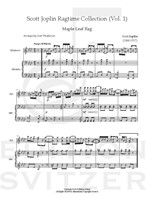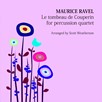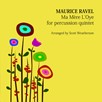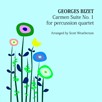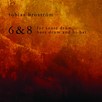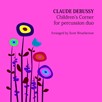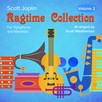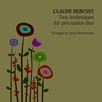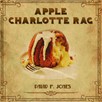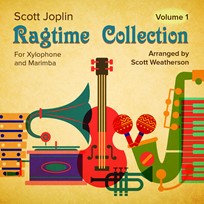
Scott Joplin Ragtime Collection (Vol. 1)
Composer: Scott Joplin
Instrument: Percussion Duo
Level: Intermediate
Published: 2014
Price: €35.00
Item details
-
Description +
-
Arranged by Scott Weatherson
Duration: 25 min.
Scott Joplin (1868-1917) was known as 'The King of Ragtime' – and with good reason. He was largely responsible for inventing and popularizing the ragtime style, writing many original ragtime compositions. Although Joplin wrote all of his ragtime solos for the piano, it has long been popular to play the melody of these rags on mallet percussion. Xylophone soloists such as George Hamilton Green and Harry Breuer expanded on the ragtime style with their own compositions for xylophone solo and became well known during the vaudeville era.
Each volume of this collection contains six of Joplin's ragtime piano solos, arranged for xylophone solo with marimba accompaniment. The pieces contained in these volumes are intended as duets between the student and teacher, with the student playing the solo part and accompanied by their teacher on marimba. The xylophone parts have been written in the style of G.H. Green, adding frequent double stops to the melody line to create extra colour and harmony. Some double stops have been notated as optional, and can be played or left out depending on the level of the player. The solo parts work equally well on marimba, especially for the slower tempos, and pieces performed in this way can be played with two players on one marimba.
Two versions of each marimba accompaniment have been included; firstly a version which is playable with only 3 mallets (two in the right hand and one in the left hand) and is suitable for intermediate marimba students; apart from Maple Leaf Rag, these parts have been transposed to fit on a 4.3 octave marimba. The second version is a fuller realization of the accompaniment part utilizing 4 mallet playing, with busier movement in the left hand mimicking the 'stride' style of ragtime playing. These parts are all written for a 5 octave instrument.
The pieces contained in each volume are:
Volume 1
1. Maple Leaf Rag
2. Original Rags
3. Heliotrope Bouquet
4. Scott Joplin's New Rag
5. Euphonic Sounds
6. Peacherine Rag
Volume 2
1. The Entertainer
2. Reflection Rag
3. Solace
4. Elite Syncopations
5. Magnetic Rag
6. Pineapple Rag
-
-
Instrumentation +
-
Percussion Duo
Required Instruments:
1 Xylophone
1 Marimba (parts for both 4.3 octave and 5 octave instruments included)
-
-
Watch+
-
About the composer +
-
Scott Joplin (1867 - 1917) was an African-American composer and pianist. Joplin achieved fame for his ragtime compositions and was dubbed the "King of Ragtime Writers". During his brief career, he wrote 44 original ragtime pieces, one ragtime ballet, and two operas. One of his first pieces, the "Maple Leaf Rag", became ragtime's first and most influential hit, and has been recognized as the archetypal rag.
Joplin was born into a musical family of railway laborers in Northeast Texas, and developed his musical knowledge with the help of local teachers. Joplin grew up in Texarkana, where he formed a vocal quartet, and taught mandolin and guitar. During the late 1880s he left his job as a laborer with the railroad, and travelled around the American South as an itinerant musician. He went to Chicago for the World's Fair of 1893, which played a major part in making ragtime a national craze by 1897.
Joplin moved to Sedalia, Missouri, in 1894 and earned a living as a piano teacher; there he taught future ragtime composers Arthur Marshall, Scott Hayden and Brun Campbell. Joplin began publishing music in 1895, and publication of his "Maple Leaf Rag" in 1899 brought him fame. This piece had a profound influence on subsequent writers of ragtime. It also brought the composer a steady income for life, though Joplin did not reach this level of success again and frequently had financial problems. Joplin moved to St. Louis in 1901, where he continued to compose and publish music, and regularly performed in the St. Louis community. The score to his first opera A Guest of Honor was confiscated in 1903 with his belongings because of a non-payment of bills, and is now considered lost. He continued to compose and publish music, and in 1907 moved to New York City to find a producer for a new opera. He attempted to go beyond the limitations of the musical form that made him famous, without much monetary success. His second opera, Treemonisha, was not received well at its partially staged performance in 1915.
In 1916 Joplin descended into dementia as a result of syphilis. He was admitted to a mental institution in January 1917, and died there three months later at the age of 49. Joplin's death is widely considered to mark the end of ragtime as a mainstream music format, and in the next several years it evolved with other styles into stride, jazz, and eventually big band swing. His music was rediscovered and returned to popularity in the early 1970s with the release of a million-selling album recorded by Joshua Rifkin. This was followed by the Academy Award–winning 1973 movie The Sting that featured several of his compositions including "The Entertainer". The opera Treemonisha was finally produced in full to wide acclaim in 1972. In 1976, Joplin was posthumously awarded a Pulitzer Prize.
-
-
Reviews +
-
Percussive Notes, November 2016
This is a very thoughtful collection. The arranger has provided a wonderful outlet for interested xylophone soloists to exercise their chops while utilizing a percussion colleague for the accompaniment. This is one of two volumes, both having six ragtime solos. Volume one includes “Maple Leaf Rag,” “Original Rags,” “Heliotrope Bouquet,” “Scott Joplin’s New Rag,” “Euphonic Sounds,” and “Peacherine Rag.” Each arrangement includes the xylophone solo and a marimba accompaniment. There are two versions of each marimba accompaniment; one version is “complete,” which is the more difficult of the two (for 5-octave marimba) and the other is a “watered-down” version (for 4.3-octave marimba).
The solo parts have been embellished as we would see in the ragtime music of George H. Green; many double-stops have been added, etc.; however, they are optional dependent upon the abilities of the soloist. Also, in the event that a xylophone is unavailable, the performer should feel free to perform the solo part on another marimba. I am an advocate of collaborative efforts, and this collection provides an opportunity for soloists to work with colleagues of different levels of abilities or their teacher.
—T. Adam Blackstock
-
-
Credits +
-
Front Cover Graphics and Layout: Gaia Gomes
Engraving: Scott Weatherson & CPH Engraving
Printed in Copenhagen, Denmark
Copyright © Edition Svitzer
www.editionsvitzer.com
-
